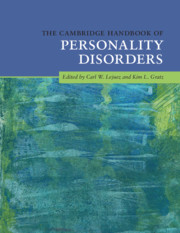Book contents
- The Cambridge Handbook of Personality Disorders
- The Cambridge Handbook of Personality Disorders
- Copyright page
- Contents
- Figures
- Tables
- Contributors
- Preface
- Part I Etiology
- 1 Neuroimaging in Personality Disorders
- 1a A Clinically Relevant Neuroscience for Personality Disorders: Commentary on Neuroimaging in Personality Disorders
- 1b Methodological Advancements Needed in Neuroimaging Research on Personality Disorders: Commentary on Neuroimaging in Personality Disorders
- 1c Illustrating the Value of Neuroimaging Studies Using the Example of Affect Regulation: Author Rejoinder to Commentaries on Neuroimaging in Personality Disorders
- 2 Issues and New Directions in Personality Disorder Genetics
- 2a Four Key Areas for Further Investigation: Commentary on Issues and New Directions in Personality Disorder Genetics
- 2b Highlighting the Value of Dimensional Conceptualizations and Environmental Influences: Commentary on Issues and New Directions in Personality Disorder Genetics
- 2c Questioning Current Directions in Personality Disorder Genetics: Author Rejoinder to Commentaries on Issues and New Directions in Personality Disorder Genetics
- 3 Environmental and Sociocultural Influences on Personality Disorders
- 3a Evidence for Caregiver Factors Proposed by Attachment and Biosocial Theories in the Development of Personality Disorders: Commentary on Environmental and Sociocultural Influences on Personality Disorders
- 3b Towards a Family Process Perspective on Typical and Maladaptive Personality Characteristics: Commentary on Environmental and Sociocultural Influences on Personality Disorders
- 3c Moving Contextual Personality Research Forward: Author Rejoinder to Commentaries on Environmental and Sociocultural Influences on Personality Disorders
- 4 Personality Pathology in Youth
- 4a Toward the Integration of Developmental Psychopathology and Personality Pathology Perspectives: Commentary on Personality Pathology in Youth
- 4b A Developmental Psychopathology Perspective on the Emergence of Antisocial and Borderline Personality Pathologies across the Lifespan: Commentary on Personality Pathology in Youth
- 4c Bridging Diverging Perspectives: Author Rejoinder to Commentaries on Personality Pathology in Youth
- Part II Models
- Part III Individual Disorders and Clusters
- Part IV Assessment
- Part V Treatment
- Index
- References
3b - Towards a Family Process Perspective on Typical and Maladaptive Personality Characteristics: Commentary on Environmental and Sociocultural Influences on Personality Disorders
from Part I - Etiology
Published online by Cambridge University Press: 24 February 2020
- The Cambridge Handbook of Personality Disorders
- The Cambridge Handbook of Personality Disorders
- Copyright page
- Contents
- Figures
- Tables
- Contributors
- Preface
- Part I Etiology
- 1 Neuroimaging in Personality Disorders
- 1a A Clinically Relevant Neuroscience for Personality Disorders: Commentary on Neuroimaging in Personality Disorders
- 1b Methodological Advancements Needed in Neuroimaging Research on Personality Disorders: Commentary on Neuroimaging in Personality Disorders
- 1c Illustrating the Value of Neuroimaging Studies Using the Example of Affect Regulation: Author Rejoinder to Commentaries on Neuroimaging in Personality Disorders
- 2 Issues and New Directions in Personality Disorder Genetics
- 2a Four Key Areas for Further Investigation: Commentary on Issues and New Directions in Personality Disorder Genetics
- 2b Highlighting the Value of Dimensional Conceptualizations and Environmental Influences: Commentary on Issues and New Directions in Personality Disorder Genetics
- 2c Questioning Current Directions in Personality Disorder Genetics: Author Rejoinder to Commentaries on Issues and New Directions in Personality Disorder Genetics
- 3 Environmental and Sociocultural Influences on Personality Disorders
- 3a Evidence for Caregiver Factors Proposed by Attachment and Biosocial Theories in the Development of Personality Disorders: Commentary on Environmental and Sociocultural Influences on Personality Disorders
- 3b Towards a Family Process Perspective on Typical and Maladaptive Personality Characteristics: Commentary on Environmental and Sociocultural Influences on Personality Disorders
- 3c Moving Contextual Personality Research Forward: Author Rejoinder to Commentaries on Environmental and Sociocultural Influences on Personality Disorders
- 4 Personality Pathology in Youth
- 4a Toward the Integration of Developmental Psychopathology and Personality Pathology Perspectives: Commentary on Personality Pathology in Youth
- 4b A Developmental Psychopathology Perspective on the Emergence of Antisocial and Borderline Personality Pathologies across the Lifespan: Commentary on Personality Pathology in Youth
- 4c Bridging Diverging Perspectives: Author Rejoinder to Commentaries on Personality Pathology in Youth
- Part II Models
- Part III Individual Disorders and Clusters
- Part IV Assessment
- Part V Treatment
- Index
- References
Summary
In their excellent review of the environmental and genetic underpinnings of personality disorders, Turner, Prud’homme, and Legg (this volume) provide compelling evidence that early family adversity (e.g., maltreatment, parenting difficulties, parental separation) is an environmental risk factor for offspring personality difficulties. However, little is known about how and why these family characteristics increase the risk for various personality disorders. Guided by evolutionary theory, the goal of this commentary is to illustrate how the synthesis of these two areas of inquiry may advance an understanding of the origins and course of typical and atypical personality characteristics in mutually informative ways. First, building on the coverage of attachment in the primary chapter, the authors address how other behavioral systems that are designed to defend against social threat and acquire resources may mediate the distinct personality sequelae experienced by children exposed to family adversity. Second, in identifying sources of heterogeneity in family risk, the authors highlight the value of expanding the conceptualization of moderators beyond diathesis-stress models. Consistent with differential susceptibility theory, they describe how temperamental, physiological, and genetic moderators may serve to heighten sensitivity to supportive as well as adverse family conditions rather than simply acting as diatheses that selective sensitize individuals to harsh socialization contexts.
Keywords
- Type
- Chapter
- Information
- The Cambridge Handbook of Personality Disorders , pp. 68 - 71Publisher: Cambridge University PressPrint publication year: 2020

